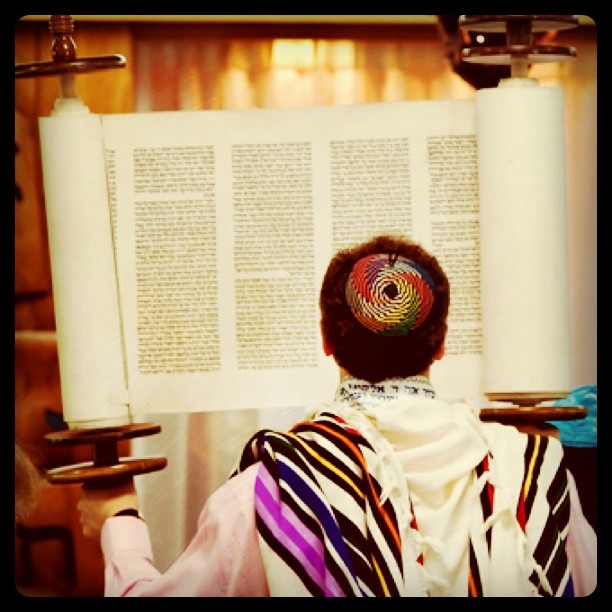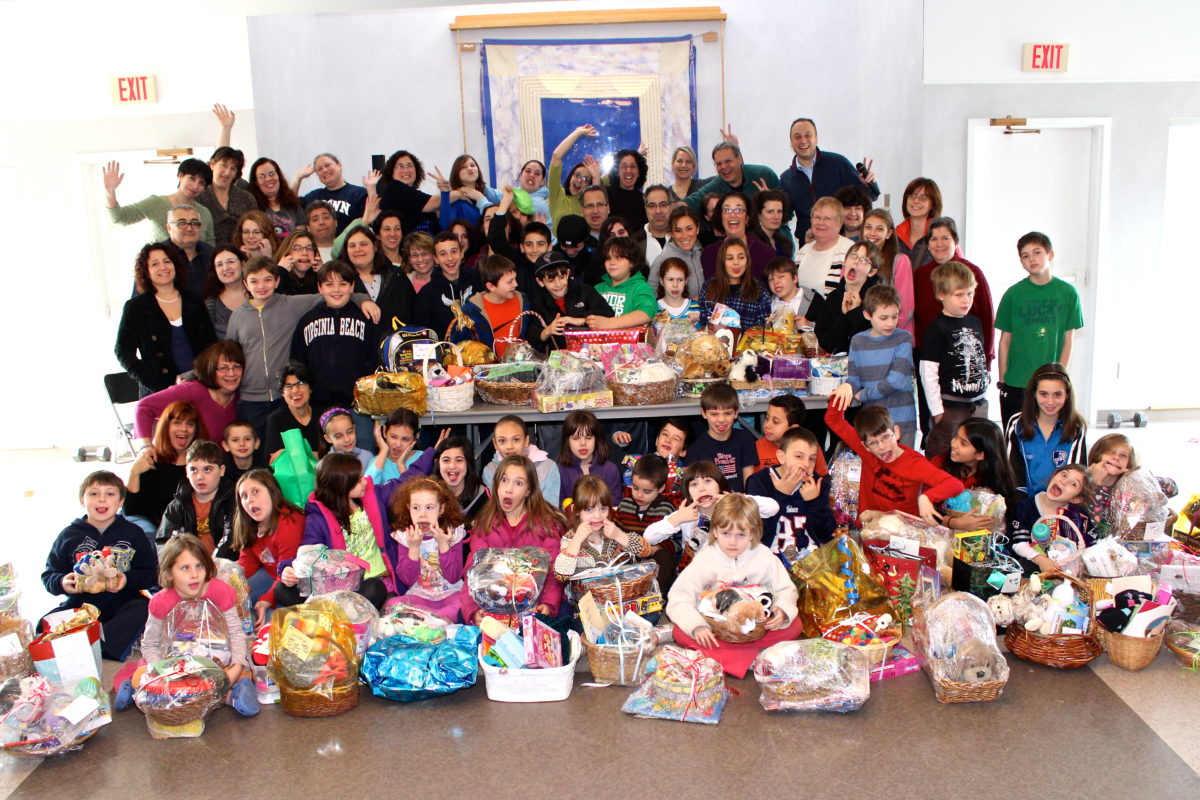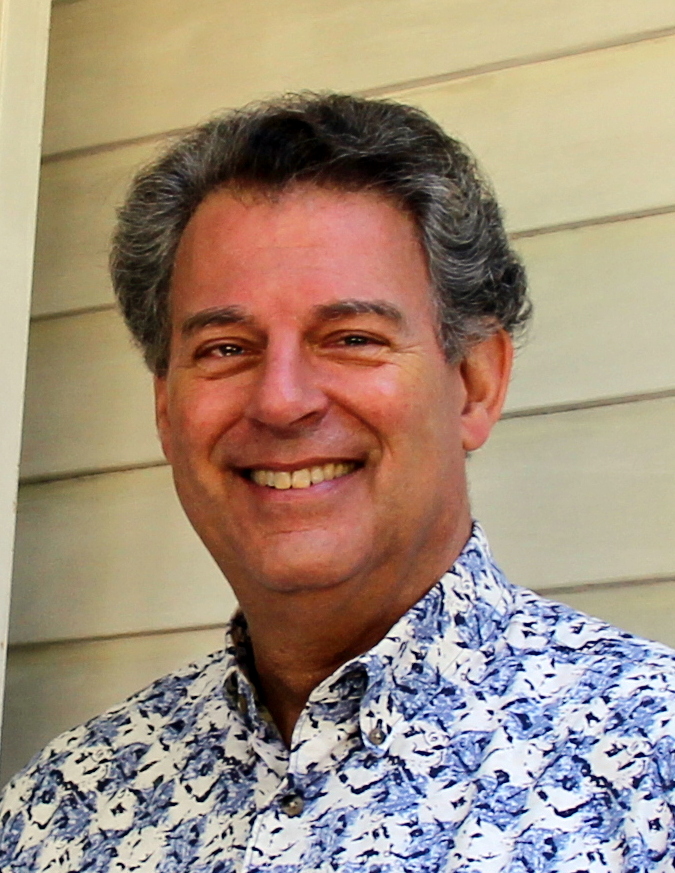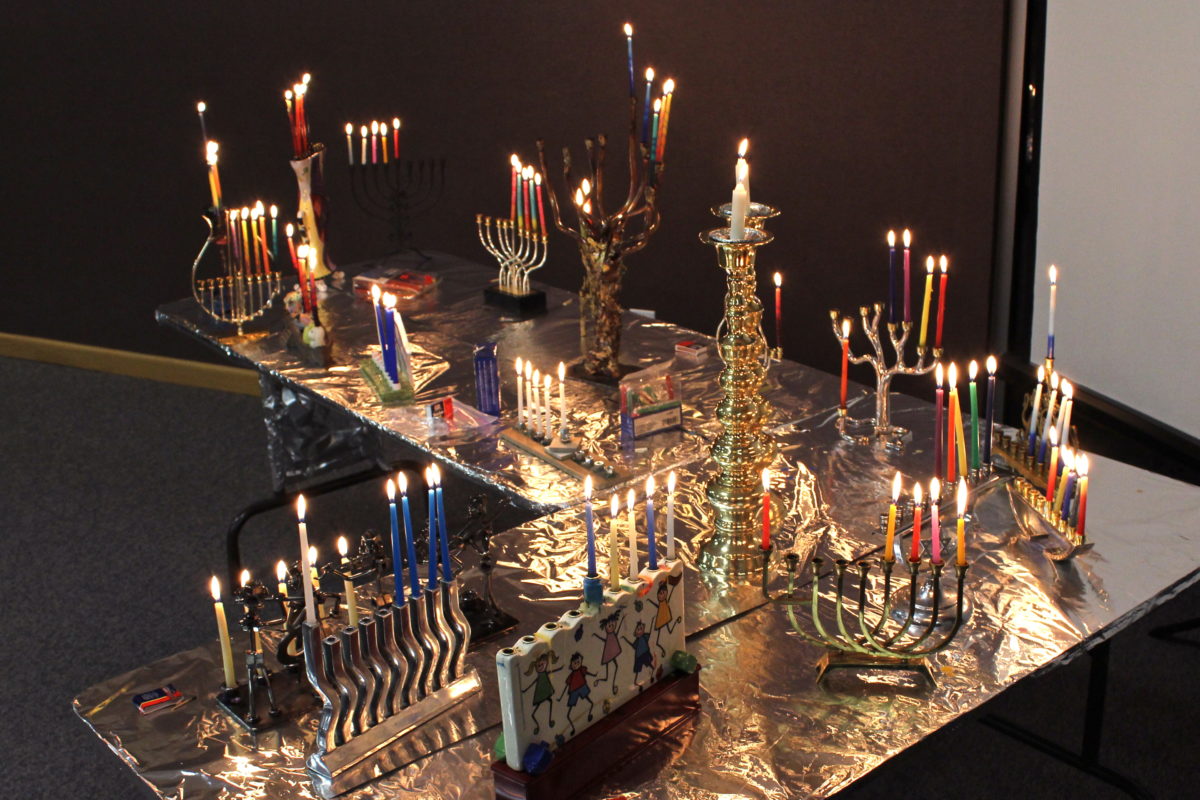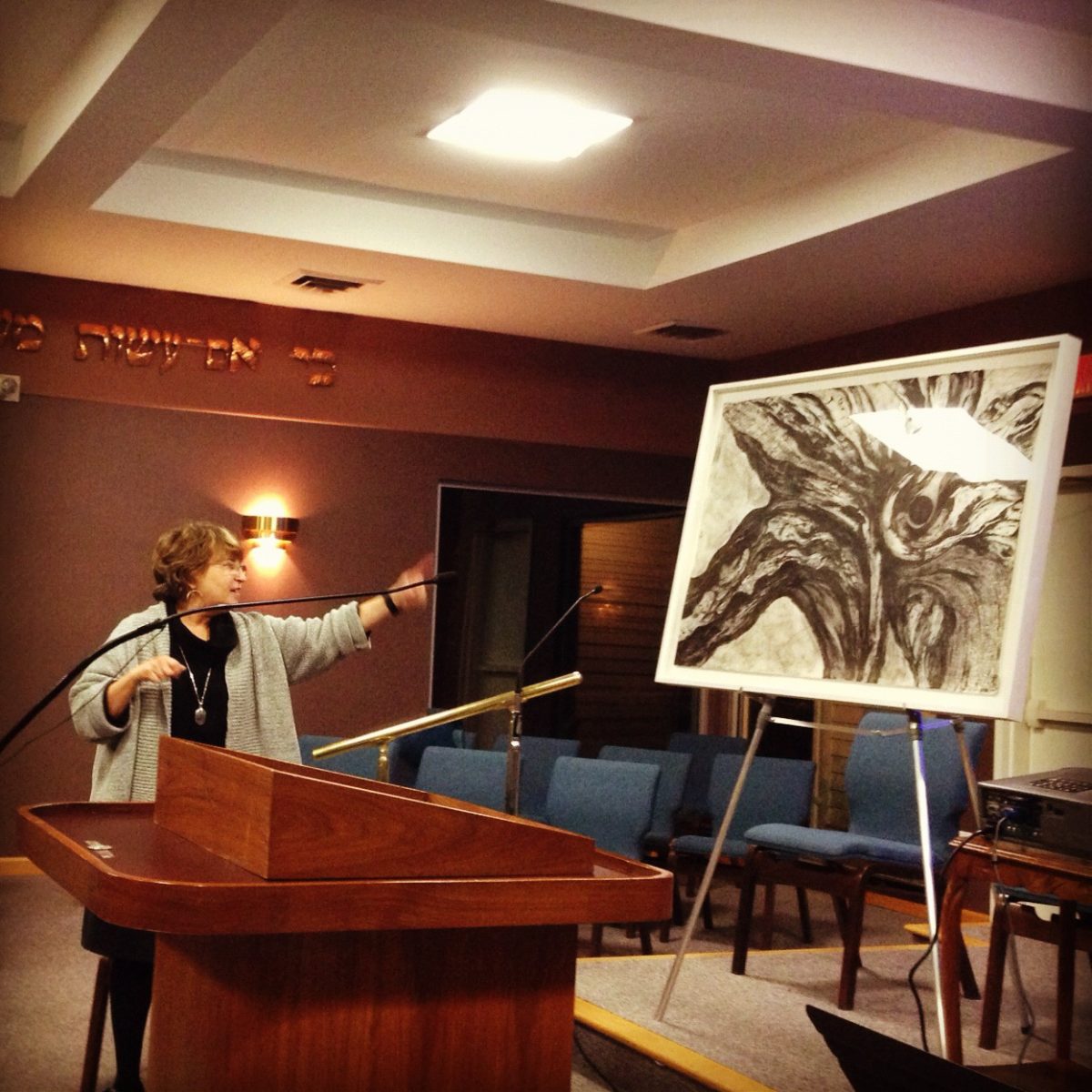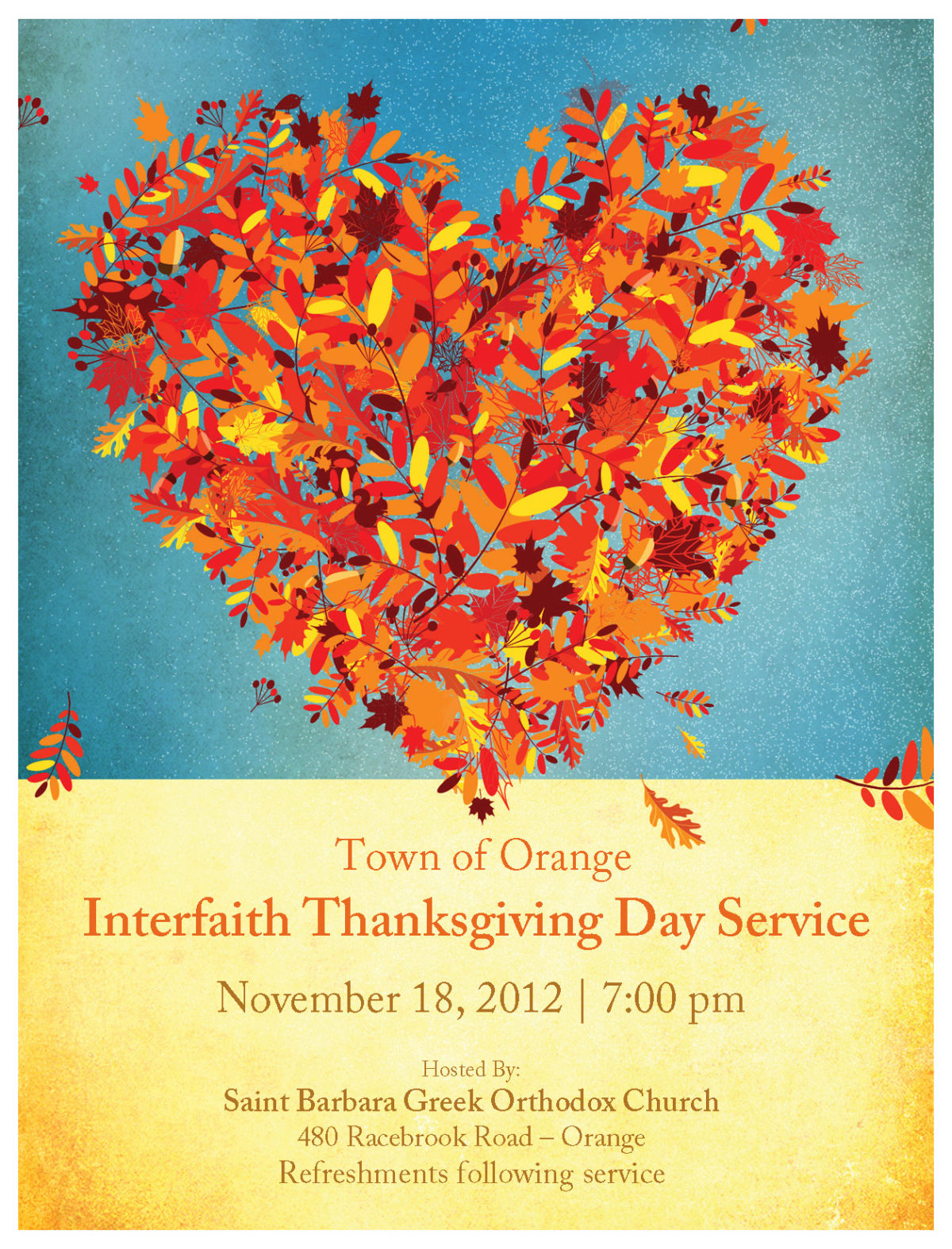 From its very inception, Reform Judaism has looked for new ways to engage with Jewish ritual. Jews all around the world have looked for ways to make the traditional prayers and customs inspiring and attractive to a modern Jew. Services were shortened (mainly through the removal of repetition of certain prayers that arose at various points in our history) to encourage better atten- dance; Dvar Torah, or sermon, was introduced in vernacular; prayers were translated and often read in the language of the land. Instrumental music was brought back into Jewish worship after centuries of absence following the destruction of the Temple in Jerusalem in 70CE. At every point in the last 200 years our movement has looked for inspiring ways to engage the Jews. Temple Emanuel has always been at the forefront of that search for meaningful and inspiring opportunities to be Jewish as part of our community.
From its very inception, Reform Judaism has looked for new ways to engage with Jewish ritual. Jews all around the world have looked for ways to make the traditional prayers and customs inspiring and attractive to a modern Jew. Services were shortened (mainly through the removal of repetition of certain prayers that arose at various points in our history) to encourage better atten- dance; Dvar Torah, or sermon, was introduced in vernacular; prayers were translated and often read in the language of the land. Instrumental music was brought back into Jewish worship after centuries of absence following the destruction of the Temple in Jerusalem in 70CE. At every point in the last 200 years our movement has looked for inspiring ways to engage the Jews. Temple Emanuel has always been at the forefront of that search for meaningful and inspiring opportunities to be Jewish as part of our community.
A number of years ago a Torah Service was added to one Friday night a month in order to provide our small congregation with an opportunity to interact
with the Torah scroll and the ritual associated with reading Torah from the scroll since we do not have a regular Shabbat morning service (when Torah is traditionally read). Every Shabbat morning a committed minyan of TE members comes together in TE’s library to read and discuss the weekly Torah portion in great detail—a wonderful tradition and a very special part of my weekly life at TE. But much as I enjoy our wonderful Torah discussions, I also miss the wonder and the joy of raising the Torah and reading the ancient words from the scroll on more than one occasion a month.
On the first Shabbat morning of January (Jan. 5th at 10:30am and every month after that), we will be adding one more opportunity to engage with Torah at Temple Emanuel—a special Torah Service with an extended discussion of the portion. Come enjoy the ritual and the joy of Shabbat and Torah celebration, as well as an opportunity to learn wisdom from its timeless teachings and the warmth of TE community. “It is a Tree of Life to those who hold fast to it!”
Author: Rabbi Michael Farbman
Chanukah Gift Giving Program a Huge Hit!
 Over 45 kids and 40 adults came together on Sunday, December 2nd for a day of learning and tzedakah. The morning started with the asepha, a gathering of parents and children filled with songs, stories and learning about Chanukah. The group then split off with the kids going back to school for an hour, and the adults joining the Rabbi for a very interesting discussion about the meaning of Tzedakah. We gathered back together for a snack and to pack over 100 gift baskets filled with books, toys, art supplies, hats, scarves and gloves as well as baby items. These baskets will be distributed by ‘r kids Family Center, Fair Haven Community Health Center and Jewish Family Services. Many people in the congregation contributed items for the baskets, and there was a wonderful feeling of cooperation and giving in the social hall. Hopefully we have touched the lives of a number of people with these baskets. Thanks to all who participated!
Over 45 kids and 40 adults came together on Sunday, December 2nd for a day of learning and tzedakah. The morning started with the asepha, a gathering of parents and children filled with songs, stories and learning about Chanukah. The group then split off with the kids going back to school for an hour, and the adults joining the Rabbi for a very interesting discussion about the meaning of Tzedakah. We gathered back together for a snack and to pack over 100 gift baskets filled with books, toys, art supplies, hats, scarves and gloves as well as baby items. These baskets will be distributed by ‘r kids Family Center, Fair Haven Community Health Center and Jewish Family Services. Many people in the congregation contributed items for the baskets, and there was a wonderful feeling of cooperation and giving in the social hall. Hopefully we have touched the lives of a number of people with these baskets. Thanks to all who participated!
Praying for Peace…
 About a month ago I read about a phone app called “tzeva adom” (code red), an Israeli early-warning service. Intrigued, I installed it (it was free) and tried to see what information it could provide. All the menus were in Hebrew — and in small print at that—making it hard to read quickly. I almost deleted the app—I figured I would be better off getting news updates from Israeli English-speaking newspaper websites such as haaretz.com, but I got distracted and the app stayed on my phone.
About a month ago I read about a phone app called “tzeva adom” (code red), an Israeli early-warning service. Intrigued, I installed it (it was free) and tried to see what information it could provide. All the menus were in Hebrew — and in small print at that—making it hard to read quickly. I almost deleted the app—I figured I would be better off getting news updates from Israeli English-speaking newspaper websites such as haaretz.com, but I got distracted and the app stayed on my phone.
A few weeks later I heard a strange alarm coming from my phone. The screen was flashing “tzeva adom Sderot,” a red alert for the town of Sderot. Suddenly the notifica- tions started coming every few seconds, listing the names of small towns and villages in the south of Israel. For the next week, my phone went crazy—the notices were coming fast and furious, listing names of bigger towns and cities every day: Be’er Sheva, Tel Aviv, Jerusalem… Each “tzeva adom” was referring to a rocket—or series of rockets— fired from the Gaza strip towards the Israeli cities. By the time I opened my eyes in the morning, my screen was filled with updates, and it kept buzzing all day long.
After a few hours I silenced my phone—the constant beeping was making it impossible to work and was unsettling to my children. I simply watched the buzzing screen, flashing the names of towns I love and places I have never heard of. I have to tell you that this little app provided one of the most powerful experiences for me. Every time my phone buzzed, thousands of Israelis ran for cover, having 15 seconds or less to reach the bomb shelter’s safety. I read the news and letters from friends and family members who were afraid to take a shower for fear of not being able to make it to a safe place when the sirens went off. I read about repeated PTSD among the children growing up in the south of Israel, children whose playgrounds and kindergarten classrooms are built as
bomb shelters… Every time the “red alert was sounded, they had to run for cover. I could silence my phone and go about my life…
By the time I got to write this column the fragile ceasefire has been renewed. The operation “Pillar of Cloud” ended without the ground invasion of Gaza, allowing most of us to breathe an uneasy sigh of relief. As we mourn the loss of life on both sides of the border, we also know that the timing of the fragile ceasefire helped avoid many more deaths that are inevitable in any military action.
Here at TE we have renewed our conversations about Israel and peace, continuing to search for ways in which we can engage with each other, reveal and debate our differing positions in a respectful environment of a loving community.
I want to draw your attention to a special program we had planned months ago when working on the TE calendar for the year. On January 12th we will hold a second in the series of TE “Divrei Laila” events, following the great success of TE Soap Box in November. We will be discuss- ing the “green line”—or the lack of it—on the maps of Israel. While the exact details and the members of the panel are still being worked on by Debbie Elkin and members of Social Action Committee that organizes this event, I encourage you all to save the date and make sure you come and join in.
I am looking forward to my phone not buzzing red alerts any time soon. Being a realist, I will not be removing the app just yet…
Wishing you all peace and quiet, happiness and joy as you celebrate Chanukah! I look forward to seeing many of you at our Shabbat Chanukah celebration on December 14th at 6pm. Check the website for more details, and sign up for dinner!
President’s Column (This One’s Reinforced!) by Bruce Spiewak
 This month I will share with you a report on some important events, concepts, goals, and directions for TE. As you know, our synagogue is generally managed by our Board of Directors and Officers. There are various standing committees as well as some special committees, which are all supervised and directed by the Board. Based on a variety of circumstances, issues and ideas generated by the Board and our Membership, there has been a general consensus among the Board that we need to pause, take a breath and evaluate and plan for our congregational future based on both our history and our vision for that future. In response to this consensus, I contacted the URJ (Union of Reform Judaism), which is a national organization to which we belong as a member synagogue. The URJ has a plethora of resources available to members, which you can peruse on their website at www.urj.org. The URJ responded to my contact by first sending a Congregational Representative to meet with the TE Executive Committee and then by organizing an all-day training session for our Board of Directors and Rabbi, which came to fruition on Sunday, November 11. Some people would refer to this session as a “retreat.” I prefer to use the term “advance.” The focus of this “advance” was determined by the attendees with the guidance of URJ facilitator Rabbi Sue Levi Elwell, Rabbinic Director, East Geographic Network, URJ. The process was both invigorating and exhausting, and by the end of the day we had formulated three major areas of focus for TE, taking into account changing demographics and economic conditions: MEMBERSHIP, GOVERNANCE and FINANCE. This “advance” is just the beginning of a continuing effort, spearheaded via the Board, to formulate specific goals, and the tasks, milestones and processes necessary in order to achieve those goals. The Board, Rabbi and Committees will be reaching out to each of you in many ways to encourage your participation, including: membershiP: ☞ Attend services and events. ☞ Reach out to your network of family, friends, colleagues, neighbors, etc., and invite them to join you at a TE service or other event. ☞ Use your “Board Buddy” as a conduit to communicate your ideas and comments to the Board. ☞ Encourage our TE youth to continue their participation post Bar/Bat Mitzvah.
This month I will share with you a report on some important events, concepts, goals, and directions for TE. As you know, our synagogue is generally managed by our Board of Directors and Officers. There are various standing committees as well as some special committees, which are all supervised and directed by the Board. Based on a variety of circumstances, issues and ideas generated by the Board and our Membership, there has been a general consensus among the Board that we need to pause, take a breath and evaluate and plan for our congregational future based on both our history and our vision for that future. In response to this consensus, I contacted the URJ (Union of Reform Judaism), which is a national organization to which we belong as a member synagogue. The URJ has a plethora of resources available to members, which you can peruse on their website at www.urj.org. The URJ responded to my contact by first sending a Congregational Representative to meet with the TE Executive Committee and then by organizing an all-day training session for our Board of Directors and Rabbi, which came to fruition on Sunday, November 11. Some people would refer to this session as a “retreat.” I prefer to use the term “advance.” The focus of this “advance” was determined by the attendees with the guidance of URJ facilitator Rabbi Sue Levi Elwell, Rabbinic Director, East Geographic Network, URJ. The process was both invigorating and exhausting, and by the end of the day we had formulated three major areas of focus for TE, taking into account changing demographics and economic conditions: MEMBERSHIP, GOVERNANCE and FINANCE. This “advance” is just the beginning of a continuing effort, spearheaded via the Board, to formulate specific goals, and the tasks, milestones and processes necessary in order to achieve those goals. The Board, Rabbi and Committees will be reaching out to each of you in many ways to encourage your participation, including: membershiP: ☞ Attend services and events. ☞ Reach out to your network of family, friends, colleagues, neighbors, etc., and invite them to join you at a TE service or other event. ☞ Use your “Board Buddy” as a conduit to communicate your ideas and comments to the Board. ☞ Encourage our TE youth to continue their participation post Bar/Bat Mitzvah.
GoVernAnce: ☞ Communicate with your “Board Buddy” (A Board member who will contact you to open direct communications). ☞ Become active or more active on a TE Committee. ☞ A ttend an occasional Board meeting. (They’re always open to members.) ☞ Prepare for future nomination to become a member of the Board. ☞ Prepare for future nomination to become an officer of the Board. FinAnce: ☞ Reach out to your network of family, friends, colleagues, neighbors, etc., and invite them to join you at a TE service or other event. ☞ Become active on the Fundraising Committee. ☞ Become active on the Program Committee. ☞ Volunteer to help out for a specific fundraising event/program. ☞ Become active on the Finance Committee. ☞ Offer any special financial skills or expertise to the Finance Committee, Office Administrator or Treasurer. ☞ P re-pay your dues/financial commitments to TE by mid-December if possible to take advantage of any appropriate tax deductions, which may be changing in 2013. ☞ Re-evaluate your family’s relationship with our TE Community, and if feasible, increase your financial commitment this membership year.
In a recent article in Reform Judaism Magazine, entitled “Why Do We Need Religion? Ask Darwin,” (http://reformjudaismmag.org/winter_2012/issue/) Jonathan Sacks discusses the concept of creating within the minds of each individual synagogue member a strong identification with and concern for the group as a whole. “As Darwin showed us, without altruism there can be no community, and without community we cannot survive.” Please, ask yourself “what unique skill, talent, and knowledge do I have that I can share with the TE Community?” Remember, when you receive a call or request to help, shout “Hineini!”
Shabbat Chanukah is coming Dec 14! Sign up now!

Chanukah is on its way! As we get ready to celebrate the Festival of Lights we make sure we have enough candles in the house, stock up on presents big and small and begin to plan the ways to celebrate! In true TE fashion we also begin to think of many opportunities to volunteer, to give tzedakah and to share our blessings. On December 2nd our Religious School will be joined by the adult community for a very special Chanukah Gift Giving Program, a special annual tradition, when we put together well over a hundred gift baskets for families in need and local support agencies. (To learn more about the program and the items needed, please follow this link.)

We join our movement, Union of Reform Judaism, in designating the 6th night of Chanukah as Ner Shel Tzedakkah, the night to give the gift to others as we encourage our children and ourselves to count our blessings and to be generous to others. And we come together as a community to celebrate Shabbat Chanukah on December 14 at 6pm, a wonderful evening of music (with our very own TE band), lights (with dozens of chanukiahs lit in our sanctuary), food (with a lovely family-style dinner after the service and a latke cook-off competition) and community, a truly unforgettable night!

To sign up for Chanukah Shabbat dinner, please follow this link. Bring your friends and family!
TE’s first Soapbox Night a great success!
 TE’s first Soapbox Night was a great success! Ten TE members courageously shared their thoughts for 7 minutes each, speaking about deep personal feelings, experiences, or issues that concern them. Topics included the development of the TE logo, Start Bank’s work with poor communities in New Haven, art as a means of overcoming life challenges, the rights of non-custodial fathers, justice for child prisoners, concerns about environmental damage from vapor trails, a love affair with literature, caring about both Israeli Jews and Palestinians, finding peace in nature, and “a late stage Jewish conundrum, feeling lost in the desert.” It was wonderful to get to know members of our community more deeply, and the talks sparked lively discussion among members afterward over desserts.
TE’s first Soapbox Night was a great success! Ten TE members courageously shared their thoughts for 7 minutes each, speaking about deep personal feelings, experiences, or issues that concern them. Topics included the development of the TE logo, Start Bank’s work with poor communities in New Haven, art as a means of overcoming life challenges, the rights of non-custodial fathers, justice for child prisoners, concerns about environmental damage from vapor trails, a love affair with literature, caring about both Israeli Jews and Palestinians, finding peace in nature, and “a late stage Jewish conundrum, feeling lost in the desert.” It was wonderful to get to know members of our community more deeply, and the talks sparked lively discussion among members afterward over desserts. 
On Hurricanes and the Power of Community
 Recent hurricane-turned-tropical storm Sandy has disrupted most of our lives. This month’s Shofar arrives late as yet another reminder of what a loss of electric power for a week can do. I hope that by now everyone has had their power restored, allowing us all to greet the cold weather with warm houses. My heart goes out to so many victims of ‘Sandy’ – to those who lost their loved ones, to those who lost their homes and cars, and years’ worth of memories and precious possessions… I watch with horror the scenes of devastation from New York and New Jersey, just as I cringe with heartache at the pictures of damaged Torah scrolls rolled out to dry in destroyed sanctuaries…
Recent hurricane-turned-tropical storm Sandy has disrupted most of our lives. This month’s Shofar arrives late as yet another reminder of what a loss of electric power for a week can do. I hope that by now everyone has had their power restored, allowing us all to greet the cold weather with warm houses. My heart goes out to so many victims of ‘Sandy’ – to those who lost their loved ones, to those who lost their homes and cars, and years’ worth of memories and precious possessions… I watch with horror the scenes of devastation from New York and New Jersey, just as I cringe with heartache at the pictures of damaged Torah scrolls rolled out to dry in destroyed sanctuaries…
Hardship and suffering tend to bring out the worst in people – the looting in flooded neighborhoods and fist fights at gas stations are, sadly, all too real. But hardship and suffering also bring out the best in people! Hundreds of thousands of people have opened their hearts, their homes, and their wallets to help their fellow human beings through this difficult time – volunteers who offer to walk up the stairs of high risers in lower Manhattan to deliver food and batteries to the elderly who are stuck in their apartments, scared and unable to get food; people renting vans in Philadelphia to fill them up with food, clothes, and gas to bring to shelters in Long Island and Brooklyn for those whose homes have been destroyed; and repair crews driving for 23 hours non-stop from all over the country to get to the northeast to help us restore our power lines.
Closer to home, the JCC opened its doors to all local residents for showers, internet, and electricity, making it possible for hundreds of people to maintain some kind of normalcy in their lives throughout the week. Our own TE members exchanged messages online and off-line, opening their homes to each other for showers and food and company. As we were fortunate enough to have power at the Temple (we only lost phones and internet for a week), we were able to host Congregation Sinai of Milford for Shabbat in our building, adding a special sense of community to our Shabbat celebration.
Storms and hurricanes will happen again. Many of us will learn to prepare better by installing generators and acquiring emergency gas stoves. I hope that we also remember that what makes it possible for all of us to make it through the difficulties that extreme weather brings is the community that surrounds us. This is why we build community around us. This is why we invest our time, our energy, our hearts and souls – and our finances – into Temple Emanuel. It is wonderful to have a community to celebrate with – on Rosh Hashanah and on Chanukah, on Pesach and on Purim. It is incredible to have support of the community when we suffer a loss or celebrate a happy milestone. But when ‘Sandy’s’ disrupt our lives, the community around us helps us support each other without having to ask for help…
The Union for Reform Judaism is raising funds to help the victims of Sandy, and I would like to encourage you all to participate as much as you can. For more information and to donate, please visit www.urj.org/sandy
Wishing you all some well-deserved warmth and calm in the month of November!
All you ever wanted to know about Haftarah – a new educational opportunity at Temple Emanuel
Have you ever found yourself wondering:
What is the difference between Torah & Haftarah?
Why does the Trope sound different for Torah & Haftarah?
Could I ever learn to chant Haftarah?
How is chanting Haftarah easier than chanting Torah?
Can I do what members of the “whale pod” do?
When’s the class & how do I sign up?
Come join Rabbi Farbman & Barbara Berkowitz for a few Thursday evenings per month, starting November 1, to answer all of those questions and more. To sign up, please follow this link!
Orange Interfaith Thanksgiving Service November 18th, 7pm
TE social action – in action!
Twelve intrepid TE members spent part of a Sunday afternoon meandering around the St. Ronan’s St. and East Rock neighborhoods in New Haven enjoying a lovely fall day (and each others’ company) as participants of the annual Cook and Care Walk-a-thon. TE members have supported the Walk-a-thon for many years. Proceeds from the Walk-a-thon support four programs for the hungry: FISH, Downtown Evening Soup Kitchen, the Community Soup Kitchen and Interfaith Volunteer Caregivers. This intergenerational/interfaith event happens every October; please consider joining us in 2015.
